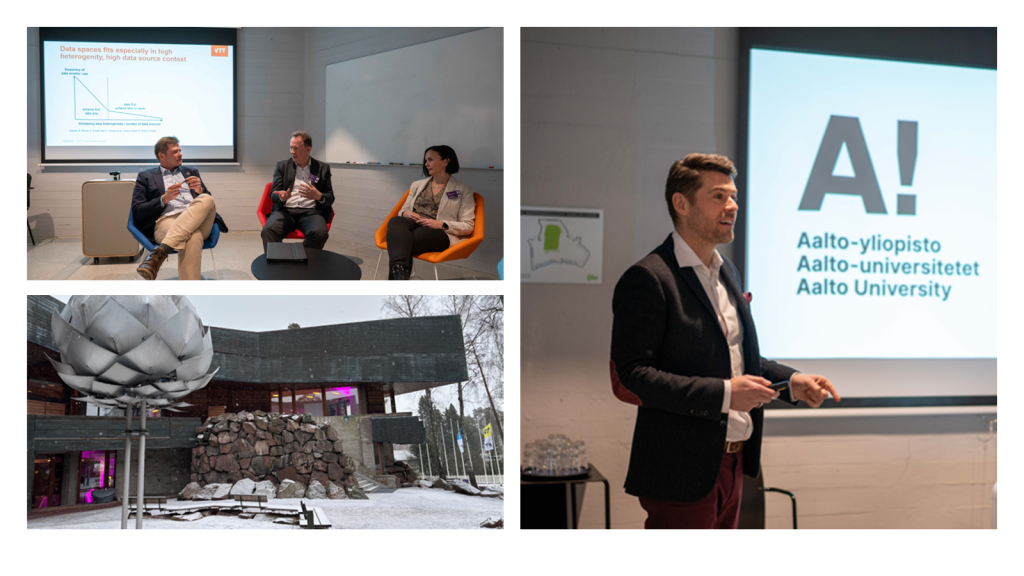
Reflections on Data Ecosystems and Data Spaces at CDOIQ Nordic Symposium 2025
This blog post highlights key insights from sessions at the CDOIQ Nordic Symposium 2025 that explored the evolving intersection of data, sustainability, and ecosystems. It examines the evolving regulatory landscape, collaborative frameworks, and practical approaches to leveraging data for operational efficiency, transparency, and innovation. Rather than summarizing the entire discussion, the commentary is a personal interpretation distilled by the author and highlights the most relevant takeaways for data leaders seeking to align data initiatives with emerging regulations, market needs, and ecosystem opportunities.
New Sustainability Regulations and Data Flow
This session featured Ken Dooley, Chief Data Officer at Granlund and Professor at Aalto University, who shared practical insights on how companies can prepare for the data challenges posed by new sustainability regulations such as the Corporate Sustainability Reporting Directive (CSRD). For many companies, sustainability reporting is no longer optional and the way companies manage their sustainability data will determine how smoothly they can adapt.
Dooley highlighted the reality many companies face: sustainability data is still often collected manually in Excel files, making reporting inefficient and time-consuming. While the market for ESG reporting tools is growing rapidly, many solutions remain in an early stage and have yet to fully meet the practical needs of organizations. To support organizations on this journey, Granlund has developed a “playbook” for sustainability and data, designed as a step-by-step guide for both operational teams and executives. A central recommendation is to start small – focusing on low-hanging fruits such as automating simple data flows, selecting technologies that match ambition levels, and finding the right balance for a minimum viable product (MVP) that delivers tangible results without overwhelming the teams.
Beyond company-level practices, the discussion also pointed to systemic challenges and upcoming regulatory shifts. Initiatives such as the European Single Access Point (ESAP) are expected to advance standardization and transparency across markets, placing additional emphasis on reliable data flows and professionalized reporting. For companies, this underscores the need to build sustainability data practices that are resilient today and adaptable to future developments.
Build Fair Data Economy through Data Ecosystems, case Traffic Data Ecosystem
Janne Lautanala, Chief Ecosystem and Technology Officer at Fintraffic, shared experiences from Finland’s Traffic Data Ecosystem, which embodies the principles of a fair data economy. As the coordinator of the ecosystem, Fintraffic facilitates collaboration across the transport sector and aims to unlock the value of shared data – enabling sustainable and efficient mobility, smarter travel, innovative services, and new opportunities for both public and private stakeholders.
In his presentation, Lautanala emphasized that building a fair data economy in traffic requires strong foundations: collaboration, robust data and infrastructure, and clear rules. The Traffic Data Ecosystem now brings together more than 220 members, providing a solid foundation for collaboration and effective data sharing across the sector. He noted that organizations join the ecosystem for various reasons, from pursuing operational excellence and better customer experiences to enabling broader data sharing beyond the ecosystem itself.
The data sharing within Traffic Data Ecosystem is governed by a rulebook, which is based on Sitra’s Playbook for Fair Data Economy. It outlines core principles and establishes a contractual framework intended to support collaboration among participants. Lautanala noted that when developing such frameworks, it is valuable to make use of existing templates, involve subject-matter experts and legal advisors early, focus on the use cases that resonate widely, and retain flexibility in the governance.
Panel on European Data Spaces in Practice – From Vision to Value
This panel brought together perspectives from logistics, traffic management, and research to explore how European data spaces can move from vision to practical business value. Moderated by Kalle Kantola (VTT) with insights from Ida Saavalainen (Ahola Group) and Janne Lautanala (Fintraffic), the discussion examined the opportunities, challenges, and possible paths forward for turning the concept of data spaces into reality.
While the vision of European data spaces is ambitious, the panelists emphasized that the real test lies in their ability to address concrete business needs. Saavalainen pointed out that in logistics, shared data is already delivering measurable impact: route optimization and emissions reduction are tangible examples where collaboration pays off. Lautanala added examples from port ecosystems, where pilot initiatives are showing how data spaces could facilitate smoother coordination between stakeholders and enhance efficiency in port operations.
At the same time, the panelists did not shy away from discussing the challenges related to data spaces. They pointed to a lack of familiarity with data space technologies, uncertainty around market fit and cost models, and concerns about data trustworthiness and quality as key barriers. Structural issues also remain, including lengthy EU-level processes and unclear incentives for commercial actors to participate.
Looking ahead, the panelists agreed that adoption will hinge on standards, timing, and strong business cases. Regulations and standardization can support adoption, but they must strike a careful balance to avoid creating barriers for companies. In the long run, the success of data spaces will depend on their ability to turn vision into reality through concrete, use-case-driven impact.
Further Reading and Context
If you’re interested to learn more about the current challenges, principles, and practical steps for regulatory data management and data sharing, check out the CDOIQ Nordic Pre-Summit 2024 blog post on Successful Data Leadership for Regulatory Data Management. It shares lessons learned from the community, like how to build better data leadership and why systems thinking matters.
You can also find another post with practical frameworks and playbooks that goes into more detail about things like the Traffic Data Ecosystem rulebook and how to set up fair and scalable data sharing. These earlier blogs provide useful background and tools that complement this year’s symposium discussions.
 Anne Liis Kasterpalu is a Data Management Consultant at Tietoevry Tech Services, where she helps organizations strengthen their ESG data practices and build robust data management capabilities. She has a solid background in enterprise information management, with hands-on experience in data management capability assessments, framework development, and leading improvement projects across diverse industries. Alongside her consulting work, she explores interorganizational data sharing, governance, and the role of emerging data ecosystems as part of her master’s studies at Aalto University.
Anne Liis Kasterpalu is a Data Management Consultant at Tietoevry Tech Services, where she helps organizations strengthen their ESG data practices and build robust data management capabilities. She has a solid background in enterprise information management, with hands-on experience in data management capability assessments, framework development, and leading improvement projects across diverse industries. Alongside her consulting work, she explores interorganizational data sharing, governance, and the role of emerging data ecosystems as part of her master’s studies at Aalto University.


